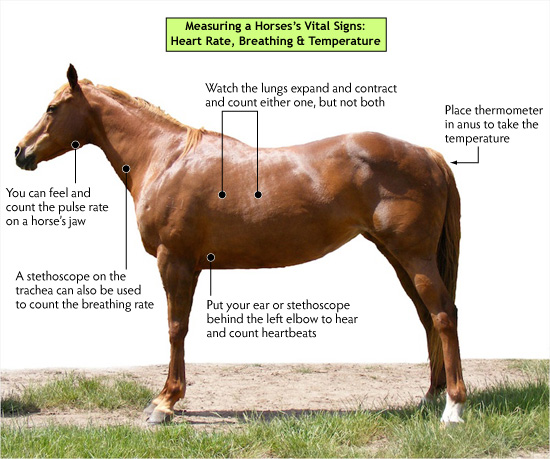Knowing your horse’s baseline vital signs will help you determine faster when something may be off. Every horse’s normal can be a little different so it is important to periodically check their pulse, respiration, temperature and mucous membranes while they are healthy to establish their baseline.
Normal vital signs in a healthy adult horse: Normal Vital Signs in a healthy foal:
Pulse: 28-44 beats per minute Pulse: 80-100 beats per minute
Respiration (breathing): 10-24 breaths per minute Respiration: 20-40 breaths per minute
Temperature: 99-101.5 F Temperature: 99.5-102.1 F
Mucous membranes: moist and pink Mucous membranes: Moist and pink
Capillary refill time (CRT): < 2 seconds Capillary refill time (CRT): <2 seconds
Another area that owners often forget to check is the digital pulse in the hoof. A normal digital pulse is hardly detectable, but a bounding pulse can indicate serious hoof issues. Here are some pictures showing how to accurately check your horse’s digital pulse.


Checking your horses’ gums (mucous membranes) is also important. Normal mucous membranes are pink and moist, dry gums and gums that are pale, or brick red indicate an emergency and you should call us right away. You should also check the capillary refill time by gently pressing and then releasing on your horse’s gum. Then count the time it takes for the spot to turn pink again. Normal capillary refill time is 1-2 seconds.
Taking your horses vitals is not difficult but does take some practice. Common mistakes to avoid are not leaving the thermometer in long enough which could result in a false low temperature reading, taking vital signs on a nervous horse which may result in a dramatic increase in pulse and respiration, allowing the horse to sniff your hand to measure respiration as they will sniff faster than their normal breathing and double counting heartbeats (lub-dub=one beat). Knowing your horse’s baseline will help you and us determine when something is not right and can lead to your horse getting care faster if they are not feeling their best.
Please remember that NSAID’s such as banamine or bute will change your horses’ vital signs and could mask a potential problem. If you are concerned about your horse, please take their vitals PRIOR to giving any medications so you get an accurate result. Also, it is always a good idea to talk to your veterinarian prior to administering any medications.
References:





No responses yet